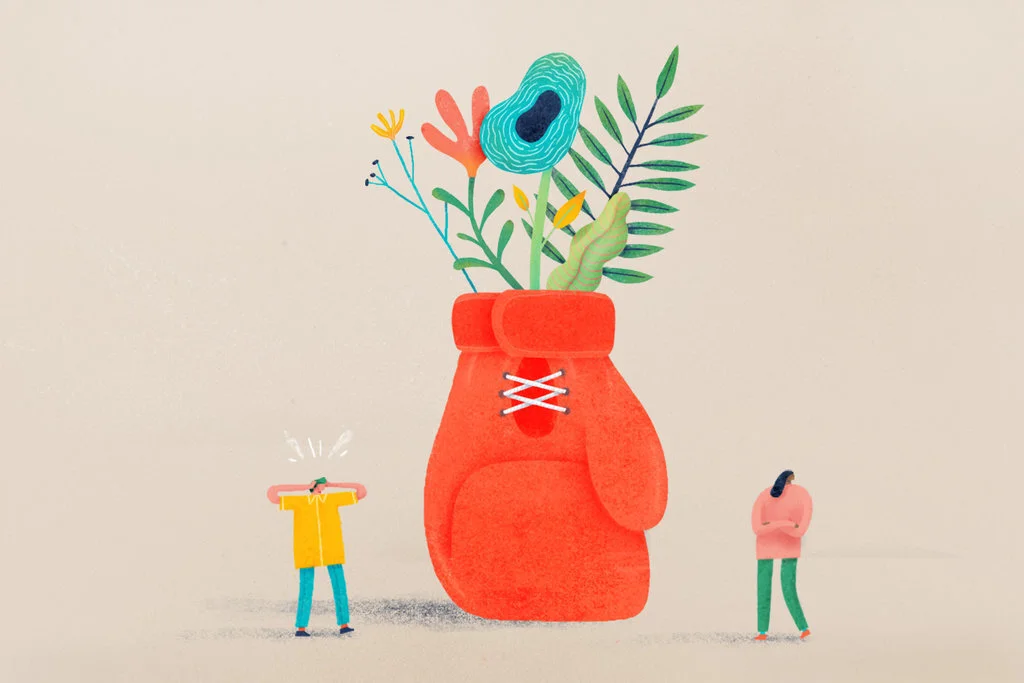How to Have a Better Relationship
Can you spot a good relationship? Of course nobody knows what really goes on between any couple, but decades of scientific research into love, sex and relationships have taught us that a number of behaviors can predict when a couple is on solid ground or headed for troubled waters. Good relationships don’t happen overnight. They take commitment, compromise, forgiveness and most of all — effort.
Love and Romance
Falling in love is the easy part. The challenge for couples is how to rekindle the fires of romance from time to time and cultivate the mature, trusting love that is the hallmark of a lasting relationship.
What’s Your Love Style?
When you say “I love you,” what do you mean?
Terry Hatkoff, a California State University sociologist, has created a love scale that identifies six distinct types of love found in our closest relationships.
Romantic: Based on passion and sexual attraction
Best Friends: Fondness and deep affection
Logical: Practical feelings based on shared values, financial goals, religion etc.
Playful: Feelings evoked by flirtation or feeling challenged
Possessive: Jealousy and obsession
Unselfish: Nurturing, kindness, and sacrifice
Researchers have found that the love we feel in our most committed relationships is typically a combination of two or three different forms of love. But often, two people in the same relationship can have very different versions of how they define love. Dr. Hatkoff gives the example of a man and woman having dinner. The waiter flirts with the woman, but the husband doesn’t seem to notice, and talks about changing the oil in her car. The wife is upset her husband isn’t jealous. The husband feels his extra work isn’t appreciated.
What does this have to do with love? The man and woman each define love differently. For him, love is practical, and is best shown by supportive gestures like car maintenance. For her, love is possessive, and a jealous response by her husband makes her feel valued.
Understanding what makes your partner feel loved can help you navigate conflict and put romance back into your relationship. You and your partner can take the Love Style quiz from Dr. Hatkoff and find out how each of you defines love. If you learn your partner tends toward jealousy, make sure you notice when someone is flirting with him or her. If your partner is practical in love, notice the many small ways he or she shows love by taking care of everyday needs.
Conflict
Every couple has disagreements, but science shows that how two people argue has a big effect on both their relationships and their health.
How to Fight
Many people try their best to avoid conflict, but relationship researchers say every conflict presents an opportunity to improve a relationship. The key is to learn to fight constructively in a way that leaves you feeling better about your partner.
Marriage researcher John Gottman has built an entire career out of studying how couples interact. He learned that even in a laboratory setting, couples are willing to air their disagreements even when scientists are watching and the cameras are rolling. From that research, he developed a system of coding words and gestures that has been shown to be highly predictive of a couple’s chance of success or risk for divorce or breakup.
In one important study, Dr. Gottman and his colleagues observed newly married couples in the midst of an argument. He learned that the topic didn’t matter, nor did the duration of the fight. What was most predictive of the couple’s marital health? The researchers found that analyzing just the first three minutes of the couple’s argument could predict their risk for divorce over the next six years.
In many ways, this is great news for couples because it gives you a place to focus. The most important moments between you and your partner during a conflict are those first few minutes when the fight is just getting started. Focus on your behavior during that time, and it likely will change the dynamics of your relationship for the better.
Here’s some general advice from the research about how to start a fight with the person you love:
Identify the complaint, not the criticism. If you’re upset about housework, don’t start the fight by criticizing your partner with, “You never help me.” Focus on the complaint and what will make it better. “It’s so tough when I work late on Thursdays to come home to dishes and unbathed kids. Do you think you could find a way to help more on those nights?”
Avoid “you” phrases. Phrases like “You always” and “You never” are almost always followed by criticism and blame.
Think about pronouns. Sentence that start with “I” or “We” help you identify problems and solutions, rather than putting blame on someone else.
Be aware of body language. No eye-rolling, which is a sign of contempt. Look at your partner when you speak. No folded arms or crossed legs to show you are open to their feelings and input. Sit or stand at the same level as your partner -- one person should not be looking down or looking up during an argument.
Learn to De-escalate: When the argument starts getting heated, take it upon yourself to calm things down. Here are some phrases that are always useful in de-escalation:
“What if we…”
“I know this is hard…”
“I hear what you’re saying…”
“What do you think?”
Dr. Gottman reminds us that fighting with your partner is not a bad thing.After all his years of studying conflict, Dr. Gottman has said he’s a strong believe in the power of argument to help couples improve their relationship. In fact, airing our differences gives our relationship “real staying power,” he says. You just need to make sure you get the beginning right so the discussion can be constructive instead of damaging.
Why Couples Fight
A famous study of cardiovascular health conducted in Framingham, Mass., happened to ask its 4,000 participants what topics were most likely to cause conflict in their relationship. Women said issues involving children, housework and money created the most problems in their relationships. Men said their arguments with their spouse usually focused on sex, money and leisure time. Even though the lists were slightly different, the reality is that men and women really care about the same issues: money, how they spend their time away from work (housework or leisure) and balancing the demands of family life (children and sex).
Money
Sometimes money problems become marriage problems.
Studies show that money is consistently the most common reason for conflict in a relationship. Couples with financial problems and debt create have higher levels of stress and are less happy in their relationship.
Why does money cause conflict? Fights about money ultimately are not really about finances. They are about a couple’s values and shared goals. A person who overspends on restaurants, travel and fun stuff often wants to live in the moment and seek new adventures and change; a saver hoping to buy a house some day may most value stability, family and community. Money conflict can be a barometer for the health of your relationship and an indicator that the two of you are out of sync on some of your most fundamental values.
David Olson, professor emeritus at the University of Minnesota, studied 21,000 couples and identified five questions you can ask to find out if you are financially compatible with your partner.
We agree on how to spend money.
I don’t have any concerns about how my partner handles money.
I am satisfied with our decisions about savings.
Major debts are not a problem
Making financial decisions is not difficult.
Dr. Olson found that the happiest couples were those who both agreed with at least four of the statements. He also found that couples who did not see eye to eye on three or more of the statements were more likely to score low on overall marital happiness. Debt tends to be the biggest culprit in marital conflict. It can be an overwhelming source of worry and stress. As a result, couples who can focus on money problems and reduce their debt may discover that they have also solved most of their marital problems.
Here’s some parting advice for managing your money and your relationship:
Be honest about your spending: It’s surprisingly common for two people in a relationship to lie about how they spend their money, usually because they know it’s a sore point for their partner. Researchers call it “financial infidelity,” and when it’s discovered, it represents a serious breach of trust in the relationship. Surveys suggest secret spending occurs in one out of three committed relationships. Shopping for clothes, spending money on a hobby and gambling are the three most-cited types of secret spending that causes conflict in a relationship.
Maintain some financial independence: While two people in a relationship need to be honest with each other about how they spend their money, it’s a good idea for both sides to agree that each person has his or her own discretionary pot of money to spend on whatever they want. Whether it’s a regular manicure, clothes shopping, a great bottle of wine or a fancy new bike -- the point is that just because you have different priorities as a family doesn’t mean you can’t occasionally feed your personal indulgences. The key is to agree on the amount of discretionary money you each have and then stay quiet when your partner buys the newest iPhone just because.
Invest in the relationship. When you do have money to spend, spend it on the relationship. Take a trip, go to dinner, see a show. Spending money on new and shared experiences is a good investment in your partnership.
Children
One of the more uncomfortable findings of relationship science is the negative effect children can have on previously happy couples. Despite the popular notion that children bring couples closer, several studies have shown that relationship satisfaction and happiness typically plummet with the arrival of the first baby.
One study from the University of Nebraska College of Nursing looked at marital happiness in 185 men and women. Scores declined starting in pregnancy, and remained lower as the children reached 5 months and 24 months. Other studies show that couples with two children score even lower than couples with one child.
While having a child clearly makes parents happy, the financial and time constraints can add stress to a relationship. After the birth of a child, couples have only about one-third the time alone together as they had when they were childless, according to researchers from Ohio State.
Here’s the good news: A minority of couples with children — about 20 percent — manage to stay happy in their relationships despite the kids.
What’s their secret? Top three predictors of a happy marriage among parents
Sexual Intimacy
Commitment
Generosity
So there you have it. The secret to surviving parenthood is to have lots of sex, be faithful and be generous toward your partner. In this case, generosity isn’t financial — it’s about the sharing, caring and kind gestures you make toward your partner every day. When you are trying to survive the chaos of raising kids, it’s the little things — like bringing your partner coffee, offering to pick up the dry cleaning or do the dishes, that can make all the difference in the health of your relationship.
Illustrations by Mark Conlan


